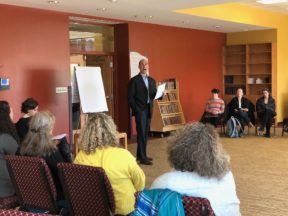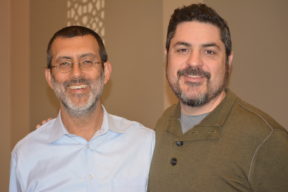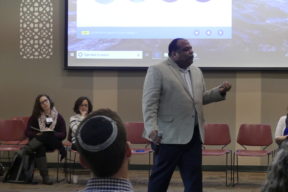
After ten years as Executive Director of JOIN for Justice and twenty-five years in the work world without a break, I had the rare opportunity to have a sabbatical last year.
When I tell most people about having had a sabbatical, they don’t know what to make of it. They imagine the academic model – did you write a book? they ask. (While having written a book is something I’d like to have said I’ve done in this life, I’m not sure I actually want to spend any time writing it. But I digress.) This sabbatical wasn’t like that. It was paid, it was three months and I didn’t have any “work” required for it. Basically, after daydreaming about the idea for three years, I finally went to the board and said “I’ve been working really hard for a decade plus, while raising a family and dealing with an illness and now my house has burnt down (true story, but I digress again). I need to build up some reserves to do my best work going forward.” They said, without stopping a beat, let’s make it happen. I was fully supported to make the dream happen, and for that, I am forever grateful.
The word sabbatical comes from the word sabbath, and most plainly means “a break”. It is related to the shmita, a rest from the harvest. Rabbi Aharon Lichtenstein points out that the full mitzvah of shabbat in the Torah is “six days you should work and the seventh you should rest.” Work and rest are inextricably linked in the mitzvah. For twenty plus years I had been harvesting – a family, a leadership development organization, a Jewish social justice field. Truth be told, I was burnt out, even if I didn’t see it back then. But I had enough perspective to know this: my fields needed a rest.
After a ton of research and organizational planning to make it happen well (see my other yet to be written article on how to get a sabbatical) I had arrived at the time in my calendar which had more white space than it ever had before. I’d spent my life getting good at juggling too much and marking my success by checking off item by item, so I started my sabbatical armed with my productivity skills in one hand, and a list of all the things I had the “time” to do in the other. There was a lot, including the “meaningful” (go on a solo silent retreat, visit long lost friends), the regular (take the kids to and from school, make dinners) and not urgent/not important (organize all those cell phone photos into something).
I needed a plan to make it all happen, and I know how to make a plan! But instead of feeling excited by the free time and opportunities, I looked at said list day after day, and arbitrarily completed some items, but mostly didn’t and then felt guilty. Somehow, I again had too much to do in too little time. I felt no compulsion to start that list. I was extremely disoriented. How can “rest” also feel so stressful? I’m doing something wrong.After a few weeks of the uncomfortable yet familiar feeling of anxiousness, I surprised myself. Instead of forcing myself to “make the most of the time” and “being productive” I put the whole damn thing down. The list. For the first time in my adult life, I just lived in the moment.
It was a strange thing, and a lot emerged that I couldn’t have planned. It was like trying on a new style of clothing; a lot of “huh” and “why not?” I started meditating on a whim, and found I loved it. I embraced a new therapist (not literally). I began walking a lot because I was gifted a fitbit. I spent time with friends and family by encouraging them to visit when they could be in town. I read or listened to books that crossed my path, and joined a book club when asked. I binged on Glow and loved it.
And then things started to change in ways I hadn’t planned. Most notably, my inner world shifted. I stopped thinking that the only thing that mattered was how much I could accomplish, and started questioning the whole paradigm of productivity as a value. I realized I was listening to my kids in a different, more patient way. I stopped the constant telling myself how hard it was to balance everything and started being grateful about all the opportunities my life had provided me. A window opened that I hadn’t even realized had closed and air flowed in. The opportunities of my future life, and of my work, again felt endless, even if I didn’t take them. I could make little changes. In fact, I could be different. Hope, as a real feeling, returned. I stopped counting down to the end of my sabbatical and rather, started thinking about how I would live differently after the sabbatical. Not what I would do, but who I wanted to be.
The sabbatical came to an end quickly, but not as quickly as I feared when I took it. I looked back at my original to do list, and found I had actually done more than I thought I had. But I let life pull me along instead of pushing myself. And it took me exactly where I needed to go. I don’t understand why this happened, and I don’t have tips for you about how others can make it happen. The only part I think I learned firsthand is the magic of fallow ground. New things grow when given space. Planned then unplanned, intended yet not labored on, the sabbatical worked. I saw again with new eyes. I had breathed and been refreshed.
And now, six months later, I am proud to formally announce that luckily for me, I returned to a community of others embracing a new path. JOIN for Justice itself, is also going through a period of deep breath and renewal. Our new strategic plan began with 2019, and it marks a shift in our own understanding of who we truly are and who we want to become. Following a 9 month period engaging 100+ members of our community of leaders, funders, and partners, we created a plan that strives to live out our values. Our new mission is to build a powerful field of Jewish leaders capable of effectively organizing for justice, both inside and outside Jewish communities in the US. We organize because, in the words of Emma Lazarus, “Until we are all free, we are none of us free”—our destinies are bound up as one.
One plank of our strategic plan demonstrates that JOIN has been on a similar voyage of discovery as I have. Slowing down to develop a strategic plan, we were able to listen to our colleagues who have cautioned us that leaders will be much more equipped to transform the world if they also are transformed themselves. They’ve told us something we already knew – that if leaders organize great victories for justice, but then burn out and fall apart, they won’t be able to defend those victories, much less bring vitality to their communities and move on to further struggles. While we already knew that, though, it was hard for us to figure out how to incorporate it into our training. Everything felt – and was – so urgent; in the couple last years especially, but, truly, always. Just as I did, JOIN has let itself be pulled, and has learned how important it is that we incorporate into our work further training to support Jewish leaders to dig into Jewish wisdom to learn how to be resilient and stay in the work – and be fed by the work – over time. If more of our leaders can learn these habits of self-care that took me 25 years to grasp, the time we took to do it will render us even more powerful, even more a force to be reckoned with.
We will be sharing more in the months to come. There will be many opportunities to lead, to connect, to learn. Please reach out if you’d like to be more involved. New things are indeed growing.











